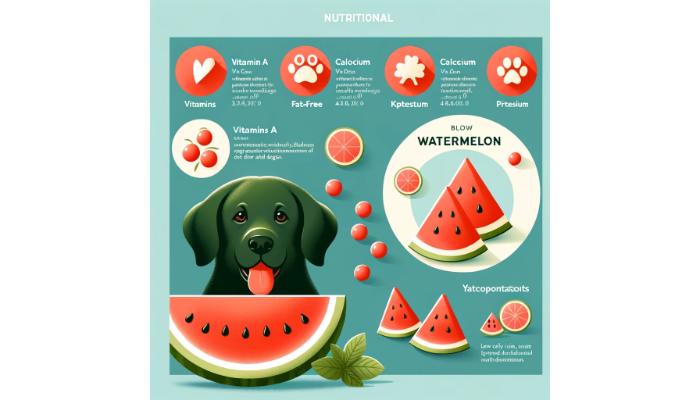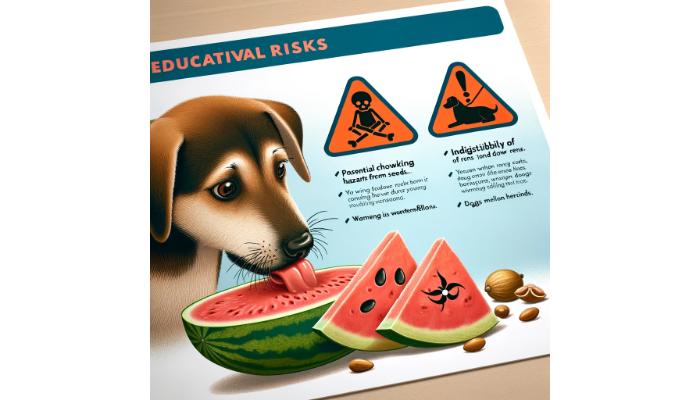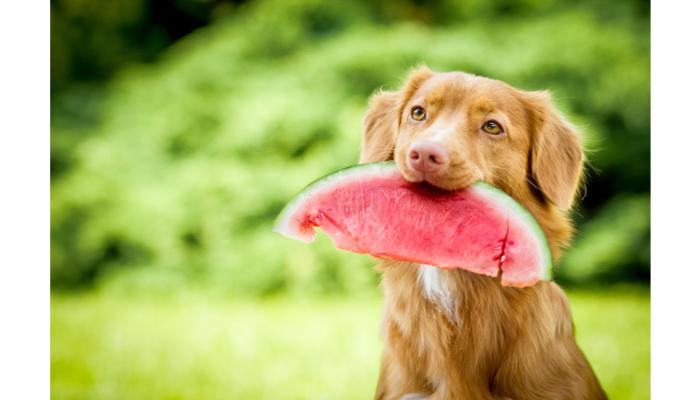Hey there! Have you ever wondered if dogs can enjoy the juicy, refreshing goodness of watermelon? Well, you’re in the right place because today, I’ll be diving into the fascinating world of dogs and watermelon. As a dog lover and expert, I’ve done my fair share of research to uncover the truth behind this fruity treat. So, if you’re curious to know if it’s safe for your furry friend to indulge in this summertime favorite, keep reading to find out!
The Nutritional Benefits of Watermelon for Dogs:

Watermelon, a delicious and refreshing fruit, is not just a summertime treat for humans. It can also be enjoyed by our furry friends! In fact, watermelon can provide some excellent nutritional benefits for dogs, making it a healthy and tasty addition to their diet.
One of the main reasons why watermelon is good for dogs is its high water content. As I mentioned earlier in this article, hydration is essential for our pets, especially during hot summer months. Watermelon is about 92% water, which can help keep our dogs hydrated and prevent dehydration. It’s a great way to supplement their water intake, especially if they’re not big fans of drinking plain water.
Aside from its hydrating properties, watermelon is also low in calories, making it a healthy snack option for dogs. This is good news for pet owners who are concerned about their furry friends gaining weight. I’m sure many of us can relate to the struggle of trying to keep our pets at a healthy weight! Watermelon can be a guilt-free treat, as long as it’s given in moderation, as with any food.
But what about the nutritional value of watermelon? Well, watermelon is packed with essential vitamins and minerals that can benefit our dogs’ health. For example, it is a good source of vitamin A, which is important for maintaining healthy skin and vision. It also contains vitamin C, which can support a strong immune system in dogs.
In addition to vitamins, watermelon also provides a good amount of fiber. Fiber is crucial for a healthy digestive system, promoting regular bowel movements and preventing constipation. So, if your furry friend occasionally suffers from tummy troubles, watermelon can be a natural and delicious way to alleviate those issues.
Before serving watermelon to your dog, it’s important to remember a few things. First, always remove the seeds and rind, as they can cause digestive problems or be a choking hazard. Stick to giving them bite-sized pieces of the juicy flesh. And as always, consult with your veterinarian if you have any concerns or if you’re unsure about introducing any new foods into your dog’s diet.
What Are the Potential Risks?
It’s important to note that while watermelon can be a healthy and safe treat for dogs when served in moderation, there are a few potential risks to be aware of. Here are some factors to consider before offering watermelon to your furry friend:

1. Digestive issues: Watermelon contains a high amount of fiber, which is generally beneficial for dogs’ digestive systems. However, consuming excessive amounts of watermelon can lead to diarrhea or an upset stomach. To avoid digestive issues, it’s best to introduce watermelon gradually into your dog’s diet and monitor their response.
2. Seeds and rind: Watermelon seeds are a choking hazard for dogs, and the rind can be difficult for them to digest. It’s important to remove all seeds and the tough outer rind before feeding watermelon to your dog. Seeds and rind can cause intestinal blockages or discomfort if ingested.
3. Diabetes or obesity: While watermelon is low in calories, it still contains natural sugars. If your dog has diabetes or is overweight, it’s essential to consult with your veterinarian before introducing watermelon to their diet. They can provide guidance on portion sizes and ensure it fits within their overall dietary requirements.
4. Allergic reactions: Although watermelon allergies in dogs are rare, some dogs may have sensitivities or develop allergies to certain fruits. If you notice any signs of an allergic reaction, such as itching, vomiting, or difficulty breathing after giving your dog watermelon, it’s crucial to consult with a veterinarian.
Remember, every dog is unique, and what may be safe for one dog may not be for another. It’s always best to err on the side of caution and consult with your veterinarian before introducing any new foods into your dog’s diet, including watermelon.
Without a conclusion paragraph, the article can flow smoothly into the next topic, providing a seamless transition for the reader.
How to Safely Serve Watermelon to Your Dog:
When it comes to sharing watermelon with your furry friend, it’s important to take a few precautions to ensure their safety and enjoyment. Here are some guidelines on how to safely serve watermelon to your dog:
- Remove seeds and rind: Watermelon seeds can pose a choking hazard for dogs, and the tough rind can be difficult to digest. Before offering watermelon to your dog, make sure to remove all the seeds and cut the fruit into bite-sized pieces, removing the rind as well.
- Feed in moderation: While watermelon is a tasty and healthy treat, it should only be given to your dog in moderation. Remember that watermelon contains natural sugars and too much of it can potentially upset their stomach or lead to diarrhea. As a general rule, treats should only make up 10% of your dog’s daily caloric intake.
- Watch for allergies: While most dogs can safely enjoy watermelon, some may have allergic reactions to it. Keep an eye out for any signs of allergies, such as itching, redness, or gastrointestinal distress. If you notice any adverse reactions, it’s best to avoid giving watermelon to your dog and consult with your veterinarian.
- Consider your dog’s health condition: If your dog has any specific health conditions such as diabetes or obesity, it’s important to consult with your veterinarian before introducing watermelon into their diet. The high sugar content of watermelon may not be suitable for dogs with certain medical issues, and portion control becomes even more critical.
- Introduce gradually: If your dog has never had watermelon before, it’s best to introduce it gradually into their diet. Start with a small piece and observe their reaction. If all goes well, you can slowly increase the amount over time.
Remember, while watermelon can be a refreshing and nutritious treat for your dog, it’s essential to follow these safety measures and consult with your veterinarian if you have any concerns about your dog’s health or diet. With the right precautions, you can safely share the deliciousness of watermelon with your beloved furry companion.
Helpful Tips for Serving Watermelon to Your Dog:

- Remove seeds and rind to avoid choking hazards and aid digestion.
- Feed watermelon in moderation to prevent stomach upset.
- Watch for any signs of allergies or adverse reactions.
- Consider your dog’s health condition before introducing watermelon.
Other Fruits Dogs Can Enjoy:
When it comes to feeding our furry friends, it’s important to make sure we offer them a balanced and nutritious diet. While watermelon is a delicious treat for dogs, there are also other fruits that they can enjoy in moderation. These fruits provide a variety of flavors and nutrients that can be beneficial for our canine companions. Here are a few other fruits that dogs can safely eat:
- Apples: Apples are a great source of vitamins A and C, as well as fiber. However, make sure to remove the seeds and core, as they can be a choking hazard.
- Blueberries: Blueberries are packed with antioxidants and can provide a tasty and nutritious snack for dogs. They are low in calories and high in vitamins C and K. Plus, their small size makes them a perfect treat for training sessions.
- Bananas: Bananas are not only delicious but also rich in potassium and vitamin C. They make a healthy and easily digestible treat for dogs. Just remember to remove the peel before offering them to your furry friend.
- Strawberries: Strawberries are a sweet and refreshing treat that can provide dogs with essential vitamins and antioxidants. However, it’s important to cut them into small pieces to avoid choking hazards.
- Pineapple: Pineapple is a tropical fruit that can be a tasty and healthy snack for dogs. It contains a natural enzyme called bromelain, which can aid in digestion. Just make sure to remove the tough outer skin and tough core before serving.
Remember, while these fruits are generally safe for dogs, it’s crucial to introduce them gradually and in moderation. Every dog is unique, and some may have specific dietary restrictions or allergies. If you have any concerns or doubts about feeding certain fruits to your furry friend, it’s always best to consult with your veterinarian.
Conclusion:
Safely serving watermelon to dogs is possible, as long as it is done in moderation and with caution. In addition to watermelon, there are other fruits that dogs can enjoy, such as apples, blueberries, bananas, strawberries, and pineapple. However, it is important to introduce these fruits gradually and in small quantities, taking into consideration any dietary restrictions or allergies that a dog may have. Before feeding any fruit to a dog, it is crucial to remove any choking hazards and consult with a veterinarian if there are any concerns. By following these guidelines, dog owners can safely incorporate fruits into their pet’s diet and provide them with a nutritious and tasty treat. Remember, always prioritize the well-being of your furry friend and make informed decisions about their diet.
Frequently Asked Questions:
Yes, dogs can eat watermelon. It’s a safe and healthy fruit for them to enjoy as an occasional treat. Just make sure to remove any seeds and rind before feeding it to them.
Dogs can also eat apples, blueberries, bananas, strawberries, and pineapple. These fruits are also safe for them in moderation. Again, remove any seeds, pits, or choking hazards before giving them to your dog.
It’s important to introduce fruits gradually and in moderation. Start with small amounts and monitor your dog’s reaction. Every dog is different, so consult with your veterinarian for specific recommendations based on your pet’s size, health, and dietary needs.
While most fruits are safe for dogs, there are a few exceptions. Avoid giving them grapes, raisins, and avocados, as these can be toxic to dogs and cause serious health issues.
If your dog has specific dietary restrictions or allergies, it’s best to consult with your veterinarian before introducing new fruits or any other food into their diet. They can provide personalized advice and recommend suitable alternatives if needed.

Hey there, I’m Janet Brooks, a dog-loving student from California. I’m all about helping pups in need, especially those without homes. Me and my awesome friends work together to give shelter and love to stray dogs. Oh, and I also write blogs about dogs to share helpful info.